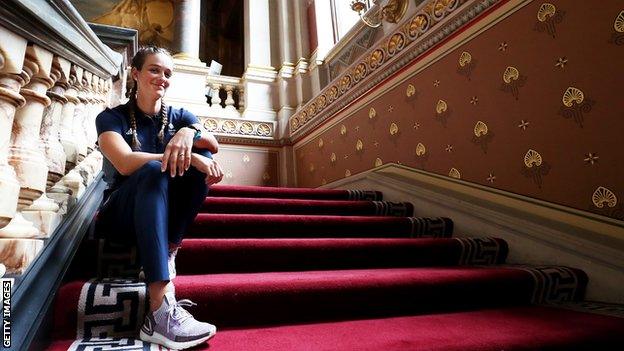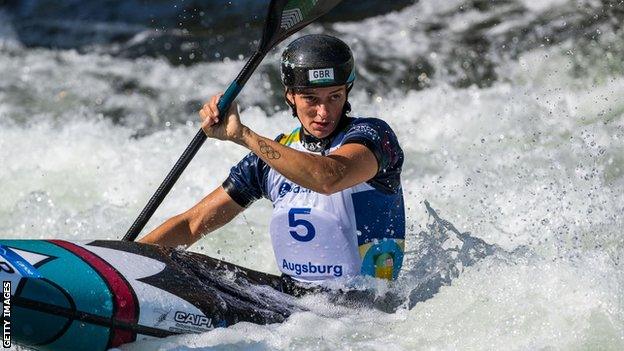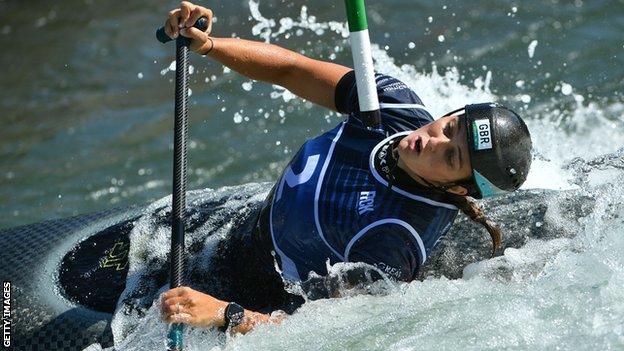Mallory Franklin: GB's most successful female canoeist still driven by career ambition
- Published

Mallory Franklin started canoeing as a child and competes professionally in three classes of the sport
Great Britain's most successful female canoeist of all time says she is still hungry for success.
Mallory Franklin won silver at the 2020 Tokyo Olympics and is a five-time World and seven-time European champion.
"100 per cent I still enjoy waking up everyday and knowing that I'm going to work on the water," she told BBC Radio Berkshire.
"Even when it's cold and ice is forming on my helmet, it's about having fun, learning and making the most of it."
The 28-year-old from Windsor has had another successful season and recently claimed a gold and two silver medals at the ICF Canoe Slalom World Cup Final in Spain.
She topped the podium in the extreme kayak event - one of the new additions to the Olympic Games programme for Paris 2024 - to be crowned the World Cup's overall champion in the discipline for 2022.
"Extreme slalom is similar to kayaking with a double ended paddle but the boats and format are quite different.
"The poles down the course are inflatables and there's four of you racing down the course at the same time.
"It's more of a battle!"

Mallory Franklin is preparing to compete at the British Slalom Open to cap off another successful season
"I've been canoeing for 23 years!"
Franklin is now preparing to take on the best athletes from around the UK in the British Slalom Open at the Lee Valley White Water Centre, which was built for the London 2012 Olympic Games.
"It's a world-class venue and most countries would consider it one of the best in the world," added Franklin.
"From a British canoeing perspective, the facilities and gym are really good, we have physiotherapy, performance analysis, good controllable water that is pumped so we can move the course around. The whole of Lee Valley is a great environment for training."
The Olympic silver medallist, who has been canoeing most of her life, has had a remarkable rise through the sport and admits her interest in it came as a bit of a fluke.
"I started paddling before I even started school.
"My brother was a little too active and his teachers encouraged my parents to find something for him to do, so we went to the local leisure centre in Windsor and tried swimming.
"But next door was the Windsor and District Canoe Club, and they were having an open day with a barbecue and all the boats out for people to try, for fun.
"I instantly took to it and never stopped - I think I've been canoeing for 23 years now!"

Mallory Franklin says the physical and mental demands of the sport have been tough but they have helped her to grow as a person
"I've grown a lot and I'm stronger because of it."
Franklin says her desire to keep improving is one of the biggest factors that has allowed her to stay at the top of her game for so long, but she admits success in the sport does not come without sacrifice.
"In those years that shape you, 12 and 13, when kids are having parties, I wasn't always invited because I wasn't really that social and I didn't go round people's houses after school because I was always training or away at the weekends - those were probably the biggest sacrifices when I was young.
"As you get older it's more of a physical sacrifice because you put your body through a lot and there is the mental toll too, you have depressed and elated periods, all those emotions can be a strain.
"Maybe if I had gone and had a more normal life I wouldn't have had that amount of stress. But I've grown a lot and I'm much stronger because of it."
Franklin's haul of medals hang proudly on the wall in her living room as a constant reminder of her years of achievement and success in the sport. Only her Olympic silver medal is tucked away in a box somewhere safe.
She has thought about when she might retire. But it will not be before she completes her main goal, which she is still hungry to achieve before she calls time on her outstanding career.
"My biological clock is probably what will dictate my finish line in this sport. I want to have kids and I don't want to leave that too long.
"But my overall goal is to be world number one. To be the best over a long period of time and over a set of races. I want to be the person who turns up to a race and is always expected to do well."